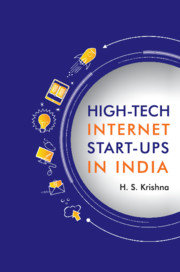Book contents
- Frontmatter
- Dedication
- Contents
- List of Tables
- List of Figures
- Preface
- Acknowledgements
- 1 Introduction
- 2 Objectives, Scope, and Methodology
- 3 High-tech Start-ups in India: Profile and Characteristics
- 4 Emergence of High-tech Start-ups
- 5 Survival of High-tech Start-ups
- 6 Growth of High-tech Start-ups
- 7 Factors influencing Life Cycle of High-tech Start-ups
- 8 Conclusions
- Bibliography
- Index
2 - Objectives, Scope, and Methodology
Published online by Cambridge University Press: 12 June 2019
- Frontmatter
- Dedication
- Contents
- List of Tables
- List of Figures
- Preface
- Acknowledgements
- 1 Introduction
- 2 Objectives, Scope, and Methodology
- 3 High-tech Start-ups in India: Profile and Characteristics
- 4 Emergence of High-tech Start-ups
- 5 Survival of High-tech Start-ups
- 6 Growth of High-tech Start-ups
- 7 Factors influencing Life Cycle of High-tech Start-ups
- 8 Conclusions
- Bibliography
- Index
Summary
Introduction
In this chapter, we present the research objectives, the conceptual framework, the scope, and the research methodology adopted for the study. The research methodology will provide the sources of data and the definitions of key variables used in this study. It will also describe the research instrument and the method of analysis that are employed to analyse the research objectives.
Objectives
The overarching research objective of this study is to investigate the dynamics involved in the life cycle of high-tech start-ups in the context of India. The knowledge about the factors that enable the sustenance of start-ups and that act as barriers, hindering the creation, survival, and success of the firms, will help in the creation of suitable policies that promote high-tech entrepreneurship in India. The outcomes of this study will help in achieving the larger objective of higher economic growth bolstered by new jobs and wealth creation due to the promotion of high-tech start-ups.
To be able to realize these, the following research objectives are outlined:
To determine the entrepreneurial, firm-specific, and external environmental factors that influence the creation of high-tech start-ups in India;
To understand the entrepreneurial, firm-specific, and external environmental factors that are critical to ensure the survival of high-tech start-ups in India;
To understand and determine the entrepreneurial, firm-specific, and external environmental factors that ensure the growth of high-tech start-ups in India;
To understand and determine the factors (entrepreneurial, firm-specific, and external environmental specific) that have an impact across the entire life cycle of high-tech start-ups in India; and
To derive policy implications for the entrepreneurs, start-up ecosystem partners, and policymakers, based on the analysis of our study.
Scope of the Study
This study will be confined to ICT start-ups operating in India. To ensure homogeneity of data, only the high-tech start-ups that are offering products and cloud-based solutions in the ICT sector are considered. This implies that start-ups that have their established headquarters in India and have majority of investments or R&D personnel in India (in cases where the start-ups have multiple global offices) will also qualify.
- Type
- Chapter
- Information
- High-tech Internet Start-ups in India , pp. 24 - 46Publisher: Cambridge University PressPrint publication year: 2019



